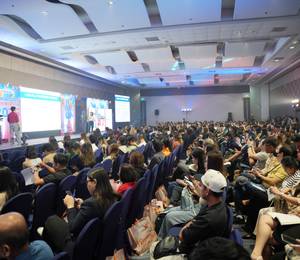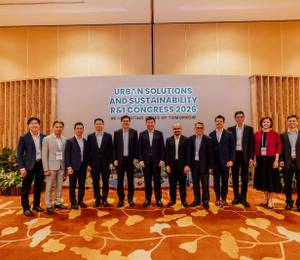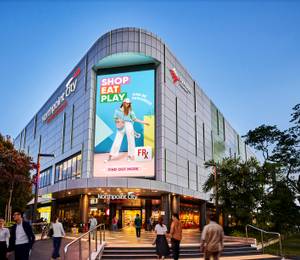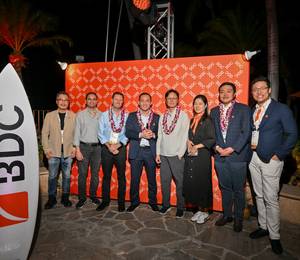Hong Kong – Xiamen is a bucolic coastal city possessing enormous potential for economic development. With the landing of Xiang’an International Airport in the south, it is marked as the gateway to the Maritime Silk Road. As of late, the UPDIS and Aedas consortium won the International Urban Design Competition for Xiamen New Airport Area; the scheme includes masterplanning for the 62 square kilometre site at the estuary of Jiuxi River along Xiamen’s southern coast line and, as well as urban design for the 15 square kilometre key area.
“The Xiang’an Airport will become a key connectivity node between Xiamen and the world. Our primary concern with the design is to mediate between the natural landscape and urban development while highlighting Xiamen’s unique culture. The key areas should serve as a fulcrum for land development, a paradigm for a future international airports,” said Aedas Director Lily Qian.
Masterplanning
The site is naturally divided into three main areas by the bay. The design seeks to create three diversified sea cities with a whole host of business functions as well as a world-class urban living room that includes leisure, cultural, entertainment, and community components. To create vibrant and resilient cities, the planning cornerstones are prioritising ecology, optimising urban layout and transportation network, and cultivating cultural and public spaces, where Xiamen characteristics are preserved and contemporised.
Key Areas
Three key areas are identified amongst the three plots to drive regional growth with synergy: a Corporate Headquarters Zone and Future Marine Park is planned on the west side of Dadeng Island, adjacent to the Airport; a Business Green Valley and Seaside Culture and Art District is set on the west bank of Jiuxi River; and a Jiuxi Science and Innovation Settlement and Maritime Community the north side of Dadeng Island and an east coast plot across the harbour.
Corporate Headquarters Zone and Future Marine Park
The Corporate Headquarters Zone occupies a crescent-shaped site along the west coast of Dadeng Island, afforded with excellent coastal resources, while the Future Marine Park is set around it. It will be shaped into a demonstration park of people-oriented future office and lifestyle, provide auxiliary support for the airport business zone as well as various industrial and urban services. Designated as the TOD hub center, it can be linked with surrounding functions from office blocks, smart communities, to research centres and more.
As a strategy to circumvent limitations imposed by the airport height and concern for ecological health, the park adopts a flat and elongated form; the design introduces roof greening, sunken plazas, waterfronts, to create a multi-dimensional scenic experience.
Business Green Valley and Seaside Culture and Art District
The Business Green Valley and Seaside Culture and Art District is positioned as a regional business centre abound with city public service. The office and financial districts are placed in close proximity, while the culture and art districts are situated facing the coastal ecological belt. The disparate parts are sutured with the coastline through a visual corridor and axis system. On account of the three-dimensional slow-moving system that seamlessly connects rail, public, and waterborne transport, a highly efficient transportation network is constructed.
The overall building layout is organised by the logic of water ecology to assimilate the city into the landscape. The design combines southern Fujian traditions and modern architectural language, employs a block module with mixed functions comprised of outer streets and inner courtyards, to build a distinct public living space. The product of this layout is a marine economic and cultural display of Xiamen’s unique temperament.
Jiuxi Science and Innovation Settlement and Maritime Community
Comprised of two zones and three smaller islands along both sides of the harbor, this area is envisioned to become an integrated maritime work-community space merging green ecology and smart environment.
It is populated with labs, conference centers, aquariums, mangrove parks, museums as well as residential clusters, with core areas created to provide supporting services to the communities. The design leverages the area’s unique geographic feature by designing diverse functions and public spaces along the coastal line, supported by a comprehensive water transport system.
Each island has a water square as its core, with multiple water lanes extending outward. Inner bays and characteristic wharfs are created to present in full view the coastal scene to residents. Users are welcomed to conduct scientific and technological discourses and conferences surrounded by the rich water scene, demonstrating a new and attractive methods of working. More, a slow-moving network is installed through plank roads, seaside and water lane trails and as a continuation of the project narrative.
“We hope that by spotlighting Xiamen’s valuable features and foregrounding the harmony between sea and city, the new airport area will stand as an icon that paves way for innovative development,” said Aedas Director Lily Qian.
Project Details
Project: International Urban Design Competition for Xiamen New Airport Area
Location: Xiamen, PRC
Masterplanning & Key Area Urban Design: Urban Planning & Design Institute of Shenzhen & Aedas JV
Host: Xiamen Airport Area Headquarters Office, Xiamen Municipal Natural Resources and Planning Bureau
Organiser: Xiamen Municipal Land Development Center
Gross Site Area: 62 square kilometres
Aedas Director: Lily Qian, Director
Photos: © Aedas
















